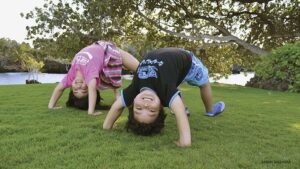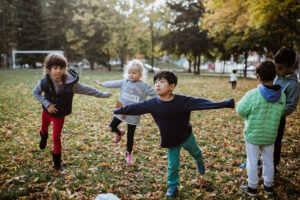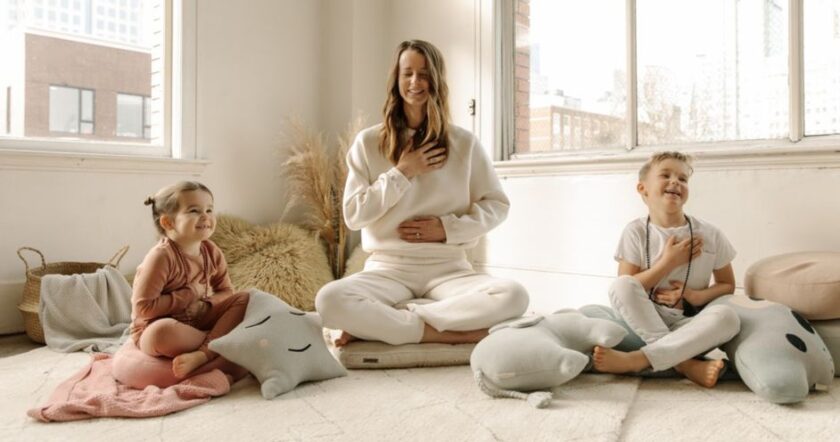Mindfulness is a highly beneficial skill that can be taught to kids by incorporating it into games and activities. Not only will their creativity and sense of fun flourish, but also their social and emotional skills.
We know that mindfulness is good for us in all sorts of ways, but new research is showing that it’s suitable for your kids as well. Getting kids to sit still for long periods can be a mission. Games like Simon Says, Jenga, balancing on one foot, and even Hide and Seek all incorporate elements of concentration and awareness that increase mindfulness.
Games like Puzzles or activities like painting keep you and the kids busy and entertained when at home and help kids learn to calm their minds and bodies. A study by Mindful Schools has shown that it increases their attention and learning skills when children practice mindfulness. Not only that, but it will also improve their emotional and social skills and their sense of resilience.
In addition, studies such as the one carried out by BMC Psychology suggest that when kids practice mindfulness, it positively impacts their development into adulthood. Engaging in mindful play around the house is excellent for your child’s mental health and decreases their chance of developing anxiety or depression later in life.
Here’s how you can begin incorporating mindfulness games into your routine with your kids. These activities are suitable for several age ranges.
1. Yoga for kids
There are several fun ways to do yoga with your kids. Not only will you be getting a quick workout in, but it’s a fantastic way for your kids to engage in not only a fun activity but awareness and concentration.
Some of the best sources for yoga for kids are Cosmic Kids Yoga and Yoga for Kids with Alissa Kepas. Both can be found with a quick YouTube search as well.
Yoga involves paying attention, concentration, group work, and calming and breathing techniques. These kinds of games or activities are ideal for increasing emotional regulation, focus, and engagement.

2. Jenga
You might find yourself getting more carried away with this game than you would expect. If you’ve never played before, the game aims to stack a tower of wooden blocks on top of each other and slowly take one from the bottom or middle of the tower to place on top. The higher and higher the tower gets, the more intense your focus becomes.
Increasing concentration skills can help with improved engagement, which helps at school. Not only that but its teaching problem-solving skills

3. Balancing on one foot
Put your skills to the test with this one too. Again, it sounds simple but requires a great deal of concentration, calmness, and multi-tasking.
The key is to get your child to focus their gaze just below eye level and preferably on one spot. Then, take one leg and rest it on your other leg but above the knee, on the ankle of the opposite foot, or wherever they feel comfortable. Try to maintain a conversation while you’re doing this or even sing a song.

4. Safari
Take your kids on a walk and tell them you are going on a Safari; their goal will be to spot as many birds, bugs, and animals as possible. A way to make this extra fun is to give them an exercise book to list all the animals they see that they can draw or decorate later.
Kids will really need to engage with all their senses and concentrate on this one. It creates a sense of awareness and grounding in the present moment.

5. Spidey – senses
Tap into your child’s obsession with superheroes and tell them they are going to be Spiderman for the afternoon.
Instruct your kids to turn on their “Spidey senses,” or the super-focused senses of smell, sight, hearing, taste, and touch that Spiderman uses to keep tabs on the world around them.
This will encourage them to pause and focus their attention on the present, opening their awareness to the information their senses bring in.

6. Taste Test
Take an assortment of different foods and cut them into bite-sized pieces. Anything your child loves to eat will do – a slice of orange or banana, a teaspoon of peanut butter or a cube of cheese.
Then, blindfold your kids and tell them you are doing a blind taste test game. Even if they guess their favourite foods straight away, prompt them to explain why. For example, was it the texture, smell, or taste that they noticed first?
This will require that they tap into all their sense and truly think about the sensation of eating mindfully.

7. Eye Spy
Car rides can make us all feel cooped up or irritable at times. One way to overcome this is by playing eye-spy.
If you have not played before, someone picks something they can see out the window and tells everyone else only the first letter of its name but keeps the rest a secret. So, everyone else will have to concentrate very hard on the outside world to guess correctly what the other person spies.
Once your child has picked their item, they will say ‘I spy with my little eye, something starting with ‘L’…’, And then the guessing begins.
This is an excellent game for focus and concentration and makes the minutes of a car ride fly by as well.

Games like these incorporate concentration, patience, mental clarity, and problem-solving skills that are invaluable life skills to foster in children. Encouraging kids to engage with their senses, creativity helps provide them with the kindness and confidence to tackle the world.



